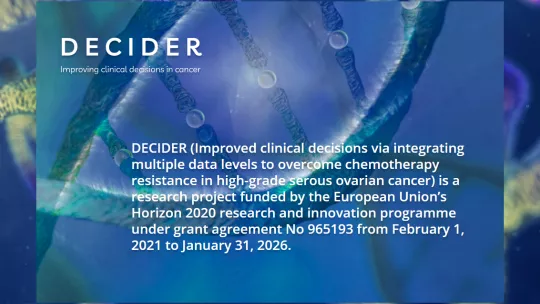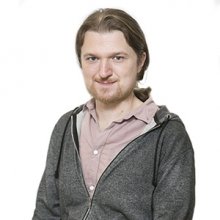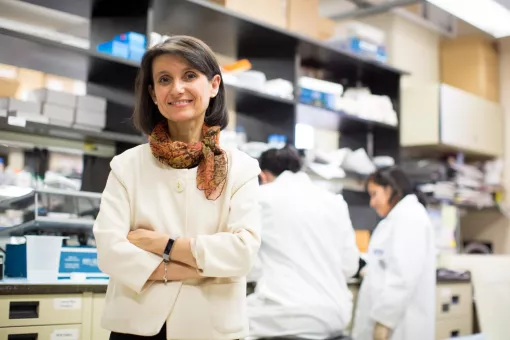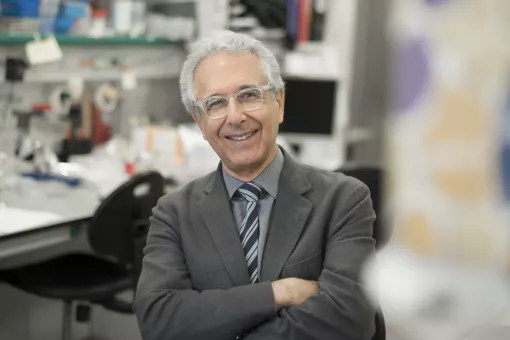Images
The 5-year research project involves 14 organisations in seven EU countries and is funded by €15 M from the EU.
The Genome Data Science lab, led by ICREA researcher Fran Supek, will analyse the evolution of ovarian tumours to develop computational models for predicting treatment resistance.
The EU has granted €15 M to fund a 5-year project that seeks to improve personalised treatments for ovarian cancer. The international DECIDER project involves partners from 14 organisations in seven EU countries.
In Europe, over 40 000 women die of ovarian cancer every year. In addition to surgery, most patients are treated with platinum-based chemotherapy. Unfortunately, the effect of the chemotherapy often decreases with treatment cycles, and few effective treatments are currently available for patients who develop resistance to platinum-based drugs.
The project kicks off in February and will develop diagnostic tools for earlier and more reliable identification of patients not responding to current treatments. Based on the data collected from the tumours, the project also aims to discover effective combination treatments.
“What makes this project unique, besides the multidisciplinary and extraordinary quality of the partners, is that we will be working with several samples from the same tumours, taken at different time points. We will be studying the evolution of the tumour, and our main goal is to be able to anticipate genetic changes in the cancer that lead to treatment resistance,” says Fran Supek, head of the Genome Data Science lab at IRB Barcelona.
“Cancer is one of the leading causes of mortality in the world and as the population ages, the incidence of cancers will only increase. Any new tools that enable better and more targeted treatment of cancers in the future will not only decrease the amount of human suffering, but also the burden on healthcare,” says Sampsa Hautaniemi, a professor at the University of Helsinki and coordinator of the DECIDER project.
Artificial intelligence to integrate and visualise patient information for doctors
In the project, a patient’s response to treatments is predicted by methods that use, among others, histopathological and genomic data from the patient. Genomic changes and aberrations in gene functions are used to find effective, personalised treatments.
At the Genome Data Science lab, 3-4 researchers will be working on the development of computational models that predict evolution of every particular tumor and that will aim to make treatment recommendations based on the genetic profile. The group will combine experimental approaches based on gene editing, and computational approaches based on machine learning to understand drug and radiation resistance mechanisms.
“Tumors often have defective mechanisms to repair their DNA, which speeds up their evolution but potentially also results in drug vulnerabilites or drug resistance. If we understand the mechanisms underlying resistance, by sequencing the tumour we would be able to predict whether it would easily be able to gain resistance to a specific drug in the future. This would lead to understanding which other treatments would be more effective on that particular tumour, to slow down its evolution and ultimately improve health outcomes,” Supek explains.
An important part of the project will be the collaboration with small-and-medium enterprises (SME) in developing, producing and registering diagnostic kits, producing a drug-sensitivity test based on the tumour samples, developing image-based diagnostics of digital samples, and developing data pseudonymisation and anonymisation techniques necessary for the management of sensitive patient data for privacy protection. Patient organisations have an important advisory role in the project.
Legal researchers address ethical and legal concerns
In addition to the medical research, the project also includes a legal work package that addresses the ethical and legal aspects of the project. Furthermore, the legal researchers will also study whether there are inconsistencies between the pharmaceutical regulatory system and other relevant legislation.
DECIDER (Clinical Decision via Integrating Multiple Data Levels to Overcome Chemotherapy Resistance in High-Grade Serous Ovarian Cancer) partners and persons in charge of the research:
- University of Helsinki, Finland (Sampsa Hautaniemi, Olli Carpén, Päivi Korpisaari)
- Hospital District of Southwest Finland (Johanna Hynninen)
- HUS Helsinki University Hospital, Finland (Anni Virtanen)
- Karolinska Institutet, Sweden (Jussi Taipale)
- Danish Cancer Society, Denmark (Tuula Kallunki)
- Heidelberg University Hospital, Germany (Julio Saez-Rodriguez)
- Institut Pasteur, France (Benno Schwikowski)
- University of Modena and Reggio Emilia, Italy (Elisa Ficarra)
- Institute for Research in Biomedicine, Spain (Fran Supek)
- Barcelona Supercomputing Center, Spain (Salvador Capella)
- Aiforia Technologies Oy, Finland (Kaisa Helminen)
- VEIL.AI Ltd, Finland (Tuomo Pentikäinen)
- 2cureX A/S, Denmark (Ole Thastrup)
- AB ANALITICA SRL (Diego Boscarino)
The Cancer Society of Finland and Association of Cancer Patients in Finland have advisory roles in representing the cancer patients.
The project has been funded by the European Union’s Horizon 2020 research and innovation programme under grant agreement No 965193.
About IRB Barcelona
The Institute for Research in Biomedicine (IRB Barcelona) pursues a society free of disease. To this end, it conducts multidisciplinary research of excellence to cure cancer and other diseases linked to ageing. It establishes technology transfer agreements with the pharmaceutical industry and major hospitals to bring research results closer to society, and organises a range of science outreach activities to engage the public in an open dialogue. IRB Barcelona is an international centre that hosts 400 researchers and more than 30 nationalities. Recognised as a Severo Ochoa Centre of Excellence since 2011, IRB Barcelona is a CERCA centre and member of the Barcelona Institute of Science and Technology (BIST).






